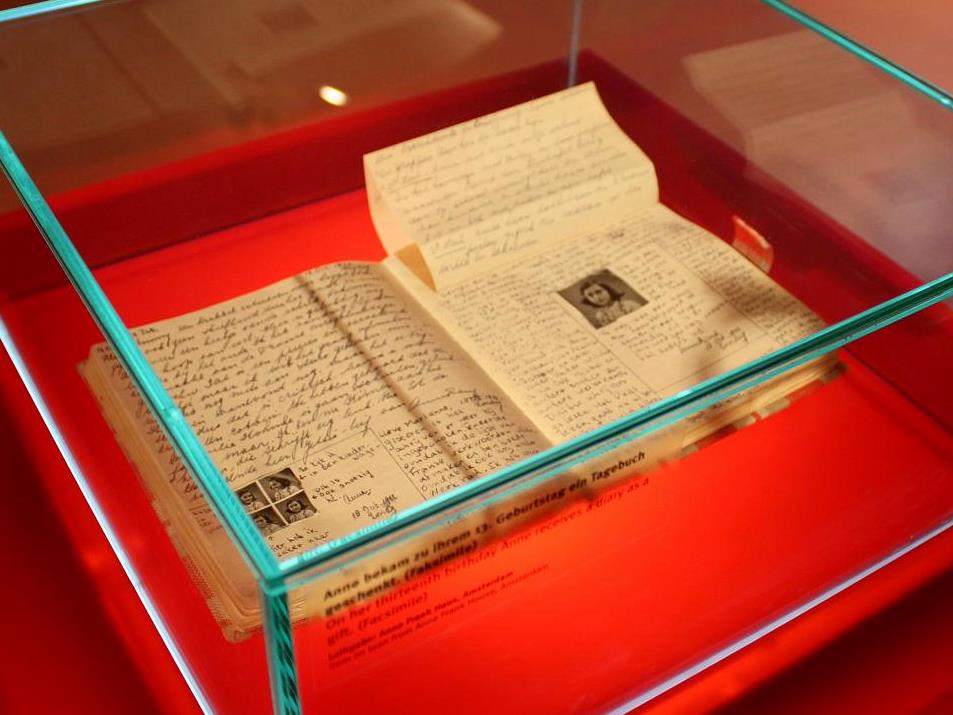Winner of the Fall 2018 StMU History Media Award for
Best Article in the Category of “World History”
Parents’ love for their children is unlike any other. It is something I think most of us often take for granted due to the fact that it is something we just cannot understand until we experience it ourselves. Our parents go to great lengths to ensure not only that we have everything we need, but that we are happy, safe, comfortable, and accomplished. The relationship between a father and his daughter, specifically, is one that in most cases is extremely strong and unlike any other. A father is the first boy in a girl’s life and he is there every step of the way. Fathers usually embody warmth and safety, and many even say that girls subconsciously look for significant others that remind them of their father. This case was no different for Otto Frank and his daughter Anne. She was always “daddy’s little girl.” Otto loved her, as well as the rest of his family, as deeply as anyone could ever ask of a father. He worked hard, always providing for them, and made every sacrifice necessary to keep his family from harm in such a terrifying time. Sometimes though, bad things happen to good people. When his family slipped through his fingers and his world shattered, Otto’s love never wavered. He took his grieving and turned it in to something beautiful. He was an outstanding father until the day he died, even if his fatherhood was slightly untraditional.

Anne Frank always wanted to be a writer, and her father was, of course, her biggest supporter. So, it was no surprise that for her thirteenth birthday, he gifted Anne a brand new, red-checkered journal that she would name “Kitty.”1 Anne grew up during a difficult time in our world: Nazi Germany. In 1933, when Hitler became Chancellor of Germany, the family, being Jewish, decided to relocate to Holland.2 For a while, life in Holland carried on as normal. But, in 1940, Anne’s sister Margot got a call from a Nazi soldier that scared the entire family.3 Since the Frank family was Jewish, they had to live out the war with great caution as well as in great fear. Almost immediately after the phone call from the soldier, Otto Frank, being the caretaker that he was, found an annex in his office building for his family to hide in, in attempts to avoid Nazi capture. Even in hiding, Anne continued to use her journal. In fact, in hiding is where she got the most use out of it. She wrote about everything that happened in the annex, from random events that occurred throughout the day to her own very personal thoughts. That diary displayed Anne in her truest form. Sadly, the life in the annex that they had become accustomed to came to a screeching halt. On August 4, 1944, Otto’s worst nightmare had come true; after over two years in the annex, the entire Frank family was captured by the Nazis, split up, and sent to various concentration camps.4 Otto Frank was left feeling like he had failed. They did not know if they would ever see each other again, or even if they would make it out alive.
When the war ended, the Frank family was devastatingly reduced to one member: Otto Frank. When he heard the news that he would never see the rest of his family again, Otto was devastated. As time passed, the broken-hearted father finally found it in him to return to the annex, where he met with Miep Gies. Miep was one of the family friends who had helped ensure the Franks were well fed and surviving as best they could while in the annex. She presented Otto with his daughter’s diary, which she had carefully saved in the bottom drawer of her desk in hopes of the girl’s return.5 Before they had been captured, every night Anne had left her diary under the protection of her father and placed it by his bed in a briefcase. She asked him never to look into it, and Otto never dared go against his beloved daughter’s wishes. When the diary had come back into his possession, he was torn. Knowing Anne wanted nothing more than to be a published writer, Otto was faced with a difficult decision. Reading the diary meant going against her wishes. Leaving it untouched not only meant the loss of her legacy, but also the loss of any chance at making Anne’s dreams of becoming a writer come true.

Otto decided to read the diary. The notion of being able to fulfill his daughter’s dreams and ensure her legacy was enough to get him to break out of his comfort zone. He believed in his daughter and her writing skills and just knew he could make something of the diary. However, it seemed that reading the diary almost put him in more of a debacle. “It took me a very long time to read it,” Otto said, “and I must say I was very much surprised of what deep thoughts Anne had.”6 Not only was he not sure what he should do next with the book, but he was now unsure if he really knew who his daughter was. “Her seriousness, especially her self-criticism; it was quite a different Anne than I had known as my daughter.”7 The diary was personal, and at times even taboo. She wrote about going through puberty, her shortcomings as a person as well as her sins. She, however, tried to keep a light within her bleak words as she insisted on wanting to be happy despite what was going on in her life.8 The Franks shared the bunker with the Van Pels family. The Van Pels had a son, Peter, who was not too far from Anne’s age. Understandably, considering her age as well as enclosed living space, Anne developed feelings for Peter, which she, of course, documented in detail within her diary.9 Otto was still at war with himself. He was worried about what people might think of his family if they read the truths Anne spoke. Could he let the world see his daughter so vulnerably? Could he withstand the responses that would surely come out in publishing the diary? Was he making the decision about him, rather than Anne?
Selflessly, Otto put any personal feelings he had aside. He loved his daughter and missed her dearly. He wanted her dreams to come true even if she would not be there to see it. Out of love, he decided to go forth and publish the diary. Otto spent long hours typing up the diary and sent the first copy to his mother, and the next few to close family friends. As word of the diary got out, publishers got hungry and offered Otto many opportunities to make it into a professionally done book. When he finally took up the offers of one publisher, the first version of the diary was published. It was titled “Het Achterhuis,” or “Secret Annex,” and excluded almost 30% of her the writings from her diary.10 This decision was meant to keep some of her privacy, as well as the family’s privacy, protected. The director of the publishing company felt that Anne spoke “too freely” about her sexuality and pushed to get rid of several passages.11 Either way, it was out in the world to be read by the masses and Anne’s dream of becoming published had finally been fulfilled. It was bittersweet for Otto, seeing the amazing success his daughter had become, but not being able to see her.

As years went on, the diary was published in many different versions in many different languages all over the world. It has had one of the most profound and lasting impacts of any book in our culture. In seventy years, the book has been translated into over seventy languages, making it one of the most translated books in the world.12 Otto didn’t stop there. For him, Anne’s legacy reaching to the world meant everything to him. He worked tirelessly on new versions of the book. After its publication, it became critically acclaimed by many influential people, such as Nelson Mandela. On top of that, there have been numerous film adaptions of the book since. In 1963, Otto founded the Anne Frank Fond (a foundation) in memory of his beloved daughter. The foundation’s one job is to spread Anne Frank’s word. It holds all copyrights and works to keep her life on paper safe.13 He took the great devotion he had for Anne and fathered her legacy from the ground up. He found a way to be a father to Anne in the physical world despite the fact she had left it.
Otto Frank was a man overflowing with love and support for his family. He went above and beyond to provide for them and keep them under his protection for as long as he could. No words can even begin to explain the pain of losing a child, much less two, along with a wife, and all due to the same reason at the same time. Yet, Otto pushed through all that hurt and turned it in to something beautiful. He gave back to the world even when it had taken everything from him. He constantly relived the life of his daughter, despite how undoubtedly hard it was, in assurance that she would become everything she was meant to be and more. A father’s love is indescribable, and Otto Frank was the perfect embodiment of the great lengths it will go to please its children.
- Anne Frank Stichting, “The History of the Diary,” Anne Frank House, April 19, 2010, http://diary.annefrank.org/the-history-of-the-diary/. ↵
- Salem Press Biographical Encyclopedia, 2013, s.v., “Anne Frank,” by Nancy D. Kersell. ↵
- Encyclopedia of Women’s Autobiography, 2005, s.v. “The Diary of a Young Girl,” by Gary Kerley. ↵
- Francine Prose, Anne Frank: the book, the life, the afterlife (New York: Harper Perennial, 2010), 63. ↵
- Francine Prose, Anne Frank: the book, the life, the afterlife (New York: Harper Perennial, 2010), 71. ↵
- The Legacy of Anne Frank, The Eternal Light (1967, the Jewish Theological Seminary of America and NBC), television program. ↵
- The Legacy of Anne Frank, The Eternal Light (1967, the Jewish Theological Seminary of America and NBC), television program. ↵
- Encyclopedia of Women’s Autobiography, 2005, s.v., “The Diary of a Young Girl,” by Gary Kerley. ↵
- Funk & Wagnalls New World Encyclopedia, 2017, s.v. “Frank, Anne.” ↵
- Encyclopedia of Women’s Autobiography, 2005, s.v., “The Diary of a Young Girl,” by Gary Kerley. ↵
- Anne Frank Stichting, “The Story of Anne Frank: Anne Frank’s Diary Is Published,” Anne Frank House, April 19, 2010, http://web.annefrank.org/en/Anne-Frank/Publication-of-the-diary/Anne-Franks-diary-is-published/. ↵
- Anne Frank Stichting, “The History of the diary,” Anne Frank House, April 19, 2010, http://diary.annefrank.org/the-history-of-the-diary/. ↵
- “Work of the Anne Frank Fonds,” Anne Frank Fonds, http://www.annefrank.ch/work-and-purpose.html. ↵



133 comments
John Cadena
Having just completed chapter 2 of Jack Hart’s Story Craft, I found myself focusing on the five areas of structure which make up a stories arc as I read through this piece. Due to the nature of this article, the exposition in the story was not hard to find. As I’m sure any parent would feel, the emotions conveyed by Anne’s father in this story perfectly set in motion the upward movement of this stories arc by allowing the reader to begin to anticipate complications that lay ahead. As the story of Anne Frank is a familiar one, it was easy for the exposition to provide “just enough backstory to explain how the protagonist happens to be in a particular place, at a particular time, with the wants that lead to the next phase of the story.” (Hart,27)
Scott Sleeter
This is a really interesting article on the story behind the story. I had never thought about how painful the publication of the diary would have been for Otto Frank. He had to struggle with many issues to decide the right course of action. To fulfill his daughter’s dream of being a published writer, it would mean violating her privacy that he had promised. I think in the end he made the right decision and did the world a favor by publishing the diary. It is an important work for a time that needs to be remembered.
Alicia Guzman
This wonderful article gives that backstory of the publication of Anne Frank’s diary along with her the before and after her time in the annex. The story of Anne Frank has always profoundly impacted me. I will never forget when my eighth grade English teacher assigned her Diary to be read. My teacher had felt is was critical to read the story of Anne’s struggle and strife while we were the age she started writing her paper. The story of Anne has continuously broken my heart throughout my life. As close as Anne was with her father, I am with mine. What blows my mind is that Anne Frank was born the same year as Dr. Martin Luther King.
Lindsey Wieck
Woah! That’s wild to think that they were born in the same year. Thanks for sharing!
Tala Owens
Congratulations of your nomination! I like that this article goes into detail about Otto Frank and how he had to deal with being the last survivor of his family. It is not talked about a lot and I learned a lot through this article. He was a very loving man and it is bittersweet how he helped Anne’s dreams of becoming a writer come true. Otto is a very strong man and the love he has for his family is admirable.
Sara Ramirez
This article was absolutely captivating, both for the style of writing and the beautiful story of a father’s love for his daughter. I think you did a really nice job getting into the mindset of Otto and explaining his initial trepidations about reading Anne’s diary, then later his decision to publish it. Something that stuck out to me was how respectful Otto was of Anne’s privacy. Even after her death, he really debated about whether or not he should read her diary. This was a wonderful tribute to a father’s love for his daughter.
Danielle Garza
Like many I have read Anne Frank’s Diary in high school and have researched her living conditions. This article is fascinating in the fact that unlike many articles and biographies, it speaks of what happened after. Most of what was written in this article I have never heard about. You always hear of the tragedy and turmoil that happened in the months before they were captured. Learning about Anne Frank’s father and changing Anne’s legacy into something inspiring is very insightful.
Alexandra Lopez
Congratulations on your nomination. The author’s article was informative and how passionate Anne Frank’s father was to publish his daughter’s journal. It was so important to him to tell her story through this journal to show others the love he had for his family despite what they were going through. Heart-warming article, great job telling the story. (reposted)
Alexandra Lopez
Congratulations on your nomination. The author’s article was informative and how passionate Anne Frank’s father was to publish his daughter’s journal. It was so important to him to tell her story through this journal to show others the love he had for his family despite what they were going through. Heart-warming article, great job telling the story.
Samantha Luckey
Congratulations on being nominated for an award! This article was extremely emotionally moving and educational. While I was aware of certain details of Anne Frank’s life, I never stopped to consider the aftermath. Overall the writing was well done, and this author was able to engage the reader to continue reading on, as well as, informing the reader of important details over the tragedy that was Otto Frank’s life. Great work!
Natalie Juarez
I had the privilege of visiting Anne Franks house when I visited Amsterdam this past April, and it was such a sad feeling knowing that she did not get to play outside of the windows of her home that I was able to see out of when I visited. Anne’s father, Otto Frank did a wonderful thing for the world by making sure his daughter’s legacy lived on with her Diary. His love for his family is emphasized throughout this article, and it was beautiful to read.